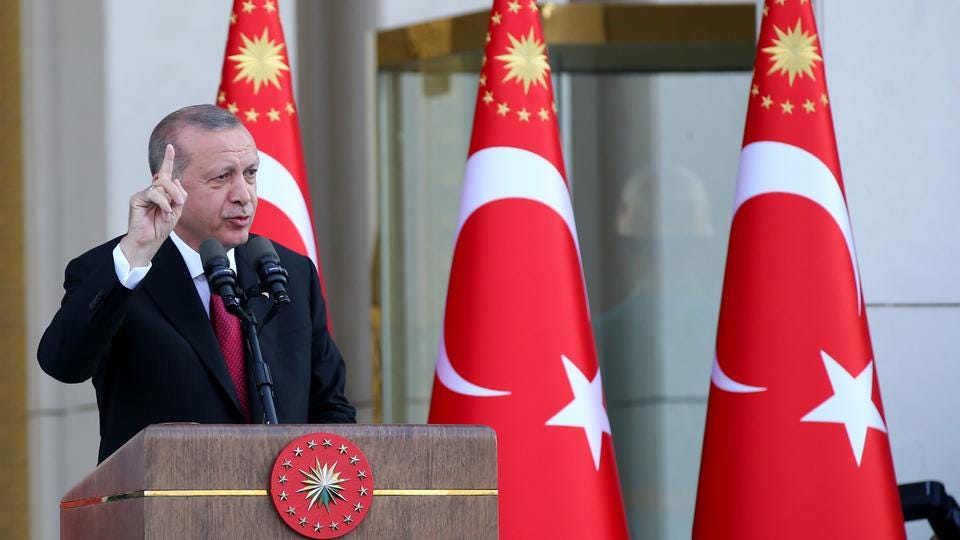Emerging Markets Monitor - August 7
China IPO Market Sizzles, Mining Boom Coming, Turkey-Russia Ties Worry West, India and UAE Eye Tanzania Ports Cooperation, Lat-Am Gov't Bonds Fizzle
The Top 5 Stories Shaping Emerging Markets from Global Media - August 7
China IPO Market Sizzles. Trounces World With $58 Billion Boom
Bloomberg
“From London to Hong Kong, large initial share sales have all but dried up across the world’s major financial centers this year. But the market in China is bustling with activity.”
“Initial public offerings on mainland exchanges have climbed to $57.8 billion so far in 2022, the largest ever for such a period, according to data compiled by Bloomberg. There have been five IPOs of above $1 billion since January, and one more is on the way. That’s versus just one such sale each in New York and Hong Kong, and none in London.”
“China’s IPO market has defied headwinds such as rising interest rates and fears of a US recession, which have brought major equity fundraising elsewhere to a virtual standstill. Offerings in the Asian economy -- whose monetary policy is diverging from the Federal Reserve -- are largely geared toward local investors.”
“The surge in listings, according to some market watchers, is also driven by concern that economic conditions could worsen later in the year as flareups in virus cases cause Beijing to stick to the strict Covid Zero strategy. Top leaders have signaled a softening on this year’s official growth target of around 5.5%, denting optimism about a rebound.” Bloomberg reports.
Hundreds of New Mines Required to Meet 2030 Battery Needs: IEA
Mining.com
“Global battery and minerals supply chains need to expand ten-fold to meet projected critical minerals needs by 2030, a report published by the International Energy Agency (IEA) has found.”
“Pressure on the supply of critical materials will continue to mount as road transport electrification expands to meet net-zero ambitions. According to the IEA, demand for electric vehicle (EV) batteries will increase from around 340 GWh today to over 3500 GWh by 2030.”
“‘Additional investments are needed in the short-term, particularly in mining, where lead times are much longer than for other parts of the supply chain. In some cases requiring more than a decade from initial feasibility studies to production, and then several more years to reach nominal production capacity,’ the report reads.”
“The projected mineral supply until the end of the 2020s is in line with the demand for EV batteries in the ‘stated policies scenario’ of the IEA’s world energy model. But the supply of some minerals, such as lithium, would need to rise by up to one-third by 2030 to satisfy the pledges and announcements for EV batteries in the ‘announced pledges scenario (APS) of the same energy model.” Henry Lazenby reports.
Western Capitals Alarmed By Deepening Turkey-Russia Ties
Financial Times
“Western capitals are increasingly alarmed about the deepening economic co-operation between Turkey’s president Recep Tayyip Erdoğan and Vladimir Putin, warning of the mounting risk that the Nato member state could be hit by punitive retaliation if it helps Russia avoid sanctions.”
“Six western officials told the Financial Times that they were concerned about the pledge made on Friday by the Turkish and Russian leaders to expand their co-operation on trade and energy after a four-hour meeting in Sochi.”
“One EU official said that the 27-member bloc was monitoring Turkish-Russian co-operation ‘more and more closely’, voicing concern that Turkey was ‘increasingly’ becoming a platform for trade with Russia.”
“…Washington has warned repeatedly that it will hit countries that help Russia to evade sanctions with ‘secondary sanctions’ that target violations beyond the US legal jurisdiction, however the EU has been more reticent about doing this.”
“US deputy Treasury secretary Wally Adeyemo met Turkish officials and Istanbul bankers in June to warn them not to become a conduit for illicit Russian money.”
“One senior western official suggested that countries could call on their companies and banks to pull out of Turkey if Erdoğan follows through on the commitments he set out on Friday — a highly unusual threat against a fellow Nato member state that could cripple the country’s $800bn economy if foreign firms agreed to comply.” The FT reports.
India’s Adani Ports and AD Ports Agree to Joint Projects in Tanzania
The National
“AD Ports Group, the operator of industrial cities and free zones in Abu Dhabi, and India's Adani Ports have signed a preliminary agreement to explore joint investment opportunities in Tanzania.”
“The two companies will collaborate on potential end-to-end logistics infrastructure and solutions, which include services for rail, maritime, port operations, digital services and an industrial zone, AD Ports said in a statement on Thursday.”
“The companies will also establish maritime academies in the East African country. AD Ports' venture in Tanzania is part of the UAE government's strategy to position Abu Dhabi as a global leader in logistics and industry, and will enable international companies to enter African markets, Mohamed Al Shamisi, managing director and group chief executive of AD Ports Group, said.”
“Tanzania's freight sub-sectors are expected to post ‘healthy’ growth rates in the short to medium term, with total trade growth projected to expand by more than 10 per cent in 2022 as the easing of Covid-19 restrictions encourages consumer spending on imports, according to Fitch Solutions.”
“Stronger global economic growth would also increase demand for Tanzanian exports. Cargo over rail, road and port are all expected to improve in the long term, as Dodoma continues to invest in turning Tanzania into an international logistics hub for East Africa, it added.” The National reports.
New LatAm Gov’t Bonds Are Rare Finds for EM Buyers
Buenos Aires Times/Bloomberg
“It’s slim pickings for investors seeking fresh sovereign bonds from Latin America as the region’s pipeline of new foreign debt empties faster than in any other pocket of emerging markets.”
“Latin American governments sold just US$21.6 billion worth of dollar, euro or yen-denominated debt this year as of Aug. 5, a 61% decline compared to the same period of 2021, according to data compiled by Bloomberg. It’s the steepest slowdown of any developing-market region as officials around the globe shy away from higher borrowing costs tied to the Federal Reserve and European Central Bank’s fights against inflation.”
“The supply of new foreign bonds around the globe has taken a major hit this year as key central banks hiked interest rates, making it more expensive for governments to tap international debt markets. Russia’s invasion of Ukraine and its impact on commodities also complicated some countries’ financing plans. Emerging-market dollar sovereign bonds handed investors losses of nearly 17% this year, compared with a 7.5% drop in US Treasuries, according to Bloomberg indexes.”
“…Still, the region stands out for its sales of debt with proceeds that claim to be earmarked for environment, social or governance-related projects. All Chile and Peru’s government issuance has been marketed as ESG this year, accounting for about half of such bonds in emerging markets, data show.” Buenos Aires Times reports.
“Out of suffering have emerged the strongest souls; the most massive characters are seared with scars.” - Khalil Gibran






